Mar 2023 1st edition
Mar 2023 1st edition Joy
English PDF version
Translations
Afrikaans
isiNdebele
isiXhosa
isiZulu
Sepedi
Sesotho
Setswana
Siswati
Tshivenda
Xitsonga
250 new traffic officers to strengthen law enforcement
250 new traffic officers to strengthen law enforcement tsoanaGovernment will soon deploy about 250 new traffic officers nationally on the roads to bolster the number of traffic officers who will enforce the rules of the road, as well as protect and serve the nation.
“These are physically fit officers and we think they will play a critical role in ensuring safety on our roads. We have trained them on all aspects of road safety and we think that this cohort will make a decisive impact on road fatalities and road crashes,” Road Traffic Management Corporation (RTMC) Spokesperson, Simon Zwane, said during an interview with SANews on Tuesday.
Depending on the operational requirements, the traffic officers will be deployed in areas of high need to assist in bringing down the number road accidents.
The key purpose of traffic officers is to ensure the safe and free flow of traffic, prevent road crashes and deaths on the roads. They ensure that all road users, including pedestrians, use roads in an orderly and safe manner.
The addition of the 250 traffic officers will increase the visibility of traffic officers on the road to ensure increased compliance from motorists. They will also ensure that as a country, we move forward to meet the target of reducing road fatalities by 50% by the year 2030,” Zwane said.
we move forward to meet the target of reducing road fatalities by 50% by the year 2030,” Zwane said.
This cohort of traffic officers started training in 2019 on the ground-breaking three-year National Qualifications Framework (NQF) level 6, which is equivalent to a National Diploma.
“This is beyond the basic course that was offered to traffic officers before. Previously, they were given a NQF level 4, which is equivalent to a matric certificate. The course has a theoretical component and a practical component, with some of the modules accredited at institutions of higher education,” Zwane said.
Traffic officers spend most of their working hours outdoors on the roads. A small portion of their time is spent in courtrooms and offices doing administrative duties. They do their patrol duties mainly in motorcars and some on motorcycles and on foot.
“Their training has been intensive and went beyond basic traffic training to include aspects of road safety, anti-crime and cross-border legislation.”
“They have also been thoroughly schooled on court procedures to produce a well-rounded traffic officer, who will be able to stand on their own to assist in the prosecution of traffic matters in court,” Zwane said.
Due to the extent of training that the traffic officers received, they will have opportunities to grow their careers within the National Traffic Police.
“They will be able to execute tasks at different levels with many opportunities open to them to specialise if they wish to. They have been trained on professional ethics and anti-corruption. RTMC has an anti-corruption unit and if a vacancy is open, they can apply if they are keen on joining the unit. They will be able to do that because they have been trained on fighting corruption within the traffic sector,” Zwane said.
The process to recruit the next cohort is underway, as the process of shortlisting has commenced. An advertisement was issued last year inviting the public to apply for a career as a traffic officer.
Preparations for graduations are underway while the logistics of the date for the pass passing-out parade are being finalised. – SAnews.gov.za
Advertorial - Vuk'uzenzele newspaper is free
Advertorial - Vuk'uzenzele newspaper is free tsoana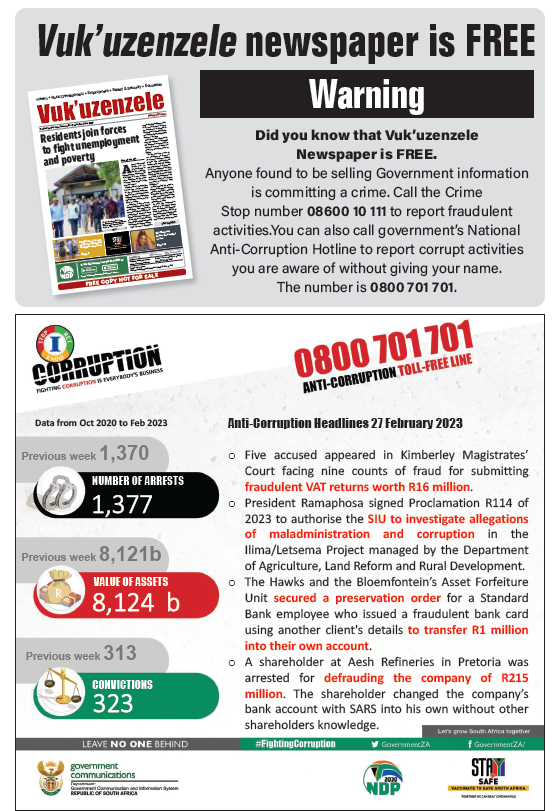
Call to remove work experience for entry-level jobs
Call to remove work experience for entry-level jobs JoyPresident Cyril Ramaphosa has reiterated the government’s call to companies, departments and State Owned Entities (SOEs) to remove the work experience requirement for young people seeking entry-level positions.
 “We reiterate our call to companies, departments and SOEs to remove the requirement for work experience for young people seeking entry-level positions,” he said.
“We reiterate our call to companies, departments and SOEs to remove the requirement for work experience for young people seeking entry-level positions,” he said.
During his State of the Nation Address (SoNA), President Ramaphosa announced that following last year’s commitment to placing over 10 000 Technical Vocational Education and Training (TVET) college graduates in employment, the government has surpassed that figure and has set a target of placing 20 000 TVET college graduates in employment in 2023.
“The number of students entering artisan training in TVET colleges will be increased from 17 000 to 30 000 in the 2023 academic year,” he said.
The President also announced that this year, the National Skills Fund (NSF) will provide R800 million to develop skills in the digital and technology sector through an innovative model that links payment for training to employment outcomes.
“One of the key ingredients for economic growth and competitiveness is the ability to attract skills which the economy needs. Having completed a comprehensive review of the work visa system, we will move quickly to implement the recommendations put forward.”
He said these include establishing a more flexible points-based system to attract skilled immigrants, implementing a trusted employer scheme to make the visa process easier for large investors and streamlining application requirements.
He added that the government will also be introducing a remote worker visa and a special dispensation for high-growth start-ups.
“While the reform programme is underway, we will continue to support public and social employment to provide work to those who need it,” the President said.
Charting Tshwane’s liberation heritage route
Charting Tshwane’s liberation heritage route tsoanaThe formation of the democratic South Africa was not a singular event. It was a decades-long tumultuous voyage of dispossession and deprivation that would ultimately lead to freedom.
Twenty-nine years into democracy, the Department of Tourism has embarked on a journey of displaying this history in a tourism route reel.
The department is developing a Tshwane Resistance and Liberation Heritage Route, a sub-route of the South African Chapter. It recently took tour guides and tour operators on an educational tour of the Tshwane sites that played a role in the liberation struggle, to share information about the sites, services and experiences they offer.
“We wanted the operators and guides just to know more about each of the sites that are part of the route,” says Deputy Director for Experiences and Route Development at the department Fundiswa Mba
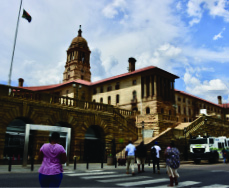
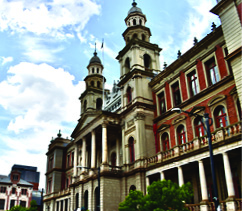
The plan is to launch the Tshwane Resistance and Liberation Heritage Route during the 2022/23 financial year.
The route is expected to fill a wide open hole in the telling of the painful history of the country.
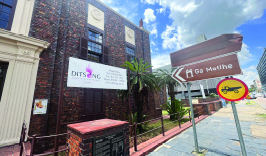
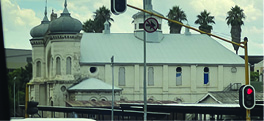
Government commits to funding SMMEs
Government commits to funding SMMEs JoyPresident Cyril Ramaphosa has announced funding initiatives for small businesses to create jobs and grow established small businesses.
Delivering the State of the Nation Address (SoNA) recently, the President said government plans to provide R1.4 billion to finance over 90 000 entrepreneurs.
In addition, government in partnership with the SA SME Fund is working to establish a R10-billion fund to support small, medium and micro enterprises' (SMME) growth.
“Government is looking at the possibility of providing R2.5 billion for the fund and for the balance of R7.5 billion to be raised from the private sector,” President Ramaphosa said.
This year, government will finalise amendments to the Businesses Act of 1991 to reduce regulatory impediments for SMMEs and cooperatives. This will make it easier for entrepreneurs to start businesses.
He said the licensing of the PostBank would lay the foundation for the creation of a state ba k that will provide financial services to SMMEs, youth- and women-owned businesses and underserved communities.
k that will provide financial services to SMMEs, youth- and women-owned businesses and underserved communities.
“As the National Assembly considers the Postbank Amendment Bill, the Postbank is reviewing its service offerings so that it can provide a viable and affordable alternative to the commercial banks,” the President said.
To address the challenge of youth unemployment, the Employment Tax Incentive has been expanded to encourage businesses to hire more young people in large numbers.
“Last year I announced that we would be seeking to reduce red tape so that we can rid our country of the unnecessary bureaucracy that often holds us back. The red tape reduction team in The Presidency under Mr Sipho Nkosi has been working with various departments to make it easier to do business,” the President said.
He said the team has taken a collaborative approach, working with departments and agencies in areas such as the mining rights system, tourism transport operator licences, visas and work permits, early childhood development and the informal sector.
The red tape reduction team was established to improve the business environment for companies of all sizes through a dedicated capacity in The Presidency to reduce red tape. – SAnews.gov.za
For more information about the SA SME Fund visit www.sasmefund.co.za
Government makes positive contribution in creating jobs for youth
Government makes positive contribution in creating jobs for youth tsoanaThe Department of Home Affairs (DHA) is recruiting the second cohort of the 4 000 unemployed youth for the digitisation of civic records project, which is meant to convert over 350 million paper records into electronic format for improved service delivery.
Applications are open and will close on 2 March. This 4 000 is part of the 10 000 unemployed young people who will be recruited on a 36 months employment contract by the Department by April 2023.
According to the department, the project started in August 2022 with the recruitment of 2 000 unemployed young graduates. As of January 2023, the department had appointed 1 341 youth.
The project is in collaboration with the Department of Employment and Labour (DEL) and Harambee Youth Employment Accelerator as part of the National Pathway Management Network.
It seeks to contribute to the employment creation goals and strategic priorities of the Presidential Employment Stimulus programme. The three-year R2.4 billion project was announced by President Cyril Ramaphosa during the 2022 State of the Nation Address (SoNA).
Kamogelo Kgatshe (23) of Ramochana in the North West province is one of the recruits who joined the project last year and her contract will end in October 2025. She believes that the South African government is doing its best to help young people find employment.
In 2020, Kgatshe completed a Bachelor’s of Information Management at the University of Johannesburg, and obtained her Honour’s Degree in Information Management in 2021 from the same university.
She came across an advert of this opportunity on Facebook in the third quarter of 2022 and applied through the DEL.
“I later received a call and was invited for an interview at DHA Brits office in the North West. Fortunately, I was appointed for a managerial post in November,” she says.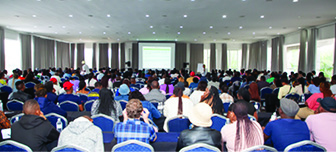
As part of her job, she ensures that daily activities are communicated through and executed, she manages and leads team leaders, she ensures safety and security of her colleagues, she resolves conflicts amongst them, she motivates them to increase productivity and meet the set goals within the department, and ensures that queries or complaints are taken in consideration.
“The experience equips me to play a supervisory role, and will help me in the future. I am also ecstatic to actually work in the field that I studied for. At least I am now able to practically apply the five years of theory that I learnt at university,” she says.
This is the third time that Kgatshe became part of government initiatives that seek to combat unemployment in the country.
She started her first job in 2020 as an Education Assistant at Tlhabane Technical High School in the North West, and her contract ended in March 2021. In 2022, Kgatshe returned to the school and worked as a COVID-19 cleaner and later was promoted to work as a Printing Machine Operator until June 2022.
“The government is changing young people's lives. I have seen a lot of drastic changes in my life by being part of this project. I am now able provide for my family and sustain myself as well,” she says.
She adds that such initiatives are not just beneficial to participants but to their households too. She encourages more young people to apply for the great opportunity, especially those who are studying towards qualifications related to Artificial Intelligence, Knowledge Management and Digitisation Courses because “we are already living in the Fourth Industrial Revolution (4IR)”.
Who can apply?
- South African citizens aged between 18 and 35 years old.
- Your qualification must match the minimum requirement of the role you are applying for.
- No criminal record; and clear credit history.
Roles and stipends
- R5 000 per month
- Document Warehouse Controllers (16 posts)
- Runners (240 posts)
- Preppers (735 posts)
- Re-assemblers (734 posts)
- Receiving Clerks (100 posts)
- Scanners (125 posts)
- Drivers (10 posts)
- Indexers (1 600 posts) - R5 500 per month
- Quality Controllers (200 posts) – R6 000 per month
- Team Leaders (210 posts) – R6 500 per month
- Tech Support (24 posts) – R9 500 per month
- Managers (6 posts) – R14 250 per month
Hard work pays off for bursary recipients
Hard work pays off for bursary recipients tsoanaAphiwe Ngwani (17) from Zwelonke High School in KwaZulu-Natal is one of the learners who made the country proud when the 2022 Matric results were released.
Ngwani, who hails from Ulundi in KwaZulu-Natal, obtained a Bachelor pass with three distinctions in English, Life Orientation and IsiZulu.
She is excited about her achievement because it is key to opening doors to her future, as she will be studying towards a Civil Engineering qualification.
“I worked hard throughout the year because I wanted to see myself becoming an engineer,” she says.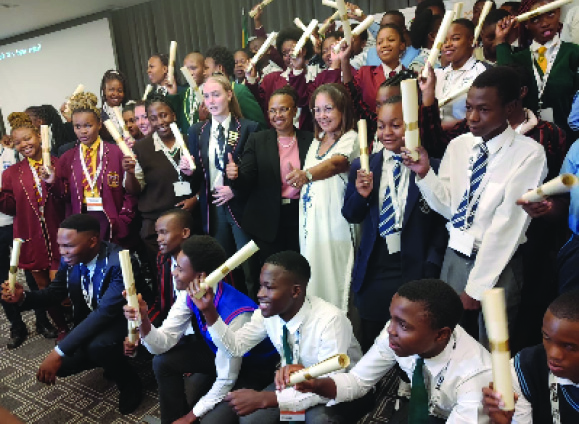
Ngwani is one of the learners who secured a bursary from the Department of Public Works and Infrastructure (DPWI) to study in the field of the built environment.
She is grateful for this opportunity because, with-
out the bursary, her dream might have been impossible to achieve.
According to Ngwani, she has been accepted by the University of Johannesburg to study for a Bachelor of Engineering (Civil Engineering).
She encourages the matric class of 2023 to work hard on their studies to achieve good results and realise their dreams.
The DPWI’s bursary programme forms part of the Skills Pipeline Programme where high school learners are encouraged to consider careers in the built environment.
The bursaries are awarded to learners in need of financial assistance, who display excellence and have been accepted for courses in the built environment for their tertiary education.
Speaking at the bursary award-giving ceremony in Pretoria recently, the department’s Minister Patricia de Lille applauded the class of 2022 for their hard work and dedication.
“The last three school years were challenging with the added factor of COVID-19, but today you can be proud of yourselves because you have reached a big milestone. Your education is one of the most important investments you can make to secure your future and be part of building our beautiful country,” said Minister De Lille.
“The DPWI is proud to have invested in your lives through the student bursaries so that you can study for a degree in the built environment and I encourage you to grab this opportunity with both hands. There is a lot of work to be done in our country and we need more skills in our country, especially in the built environment and we are starting with this investment in our young people,” she added.
DPWI bursary programme
The DPWI bursary programme has so far benefitted 524 students since 2014, including 72 matriculants who are funded in 2023. To date, the department has invested R160 million into students’ lives.
This year, the total value of the bursary is estimated at R165 000 per student per year. Of the total number of this year’s recipients, 42 are female.
The Minister encouraged the bursary recipients to continue to work hard in their tertiary education so that they can become a successful part of the country.
Director-General in the Presidency Phindile Baleni, also speaking at the event, said more female students should be given the opportunity to be involved in the built environment and other previously male-dominated fields.
The department’s bursary programme also serves as a feeder to the department’s Internship and Young Professionals Programme and later forms a pool of qualified built environment professionals to serve the state in the delivery of infrastructure projects.
The bursary is for study areas including Electrical Engineering, Mechanical Engineering, Civil Engineering, Marine Engineering, Property Studies / Real Estate, Actuarial Science, Quantity Surveying, Construction Project Management, Landscape Architecture, Architecture and Town and Regional Planning.
It covers tuition, accommodation, meals, textbooks, project and compulsory study resources and a monthly allowance.
The DPWI bursary programme is advertised annually in October interested applicants should visit www.publicworks.gov.za
Improving police call centre to fight crime
Improving police call centre to fight crime JoyThe government will over the next 12 months embark on efforts targeted at improving competitiveness in police call centre operations to support the proper functioning of the 10111 helpline.
T his was announced by President Cyril Ramaphosa during the 2023 State of the Nation Address (SoNA).
his was announced by President Cyril Ramaphosa during the 2023 State of the Nation Address (SoNA).
“Just as we have embarked on economic reforms in electricity, water, telecommunication and logistics through Operation Vulindlela, we are embarking on a process of reform to improve the effectiveness of our fight against crime,” the President said.
“We will use our competitiveness in call centre operations to support the proper functioning of the 10111 helplines, partnering with the private sector. This is to ensure that when people call the police, their calls are answered and their emergencies are attended to,” he said.
The first citizen said that violent crime takes a heavy toll on every South African.
“Communities across our country live in fear for the safety of their families. This situation cannot continue,” he said.
In recent times, the government has embarked on efforts to strengthen the South African Police Service to prevent crime and improve the capacity of the National Prosecuting Authority (NPA) and courts to ensure that perpetrators are brought to justice.
“Last year, we undertook to recruit 12 000 new police personnel. Since then, more than 10 000 recruits graduated from police academies and a further 10 000 will be recruited and trained this year,” the President said.
He added that the specialised police teams that are working on tackling crimes like kidnapping, extortion and illegal mining have had several breakthroughs, arresting dozens of suspects and achieving several convictions.
Crimes against women and children
To respond to crimes against women and children, which the President acknowledged remain endemic, government was responding through various legislative reforms.
“One of the great successes of our effort to fight gender-based violence (GBV) is the extent to which social partners have rallied around the National Strategic Plan,” he said.
In January last year, President Ramaphosa signed into law three key pieces of legislation that afford greater protection to survivors of GBV and ensure that perpetrators were no longer able to use legislative loopholes to evade prosecution.
“We continue to improve the accessibility and functioning of Sexual Offences Courts and expand the network of Thuthuzela Care Centres,” he said.
Economic sabotage
 The President said firm action was being taken by government to tackle economic sabotage and related crimes that were causing great damage to the economy. In this regard, multidisciplinary Economic Infrastructure Task Teams were now operational in 20 identified hotspots.
The President said firm action was being taken by government to tackle economic sabotage and related crimes that were causing great damage to the economy. In this regard, multidisciplinary Economic Infrastructure Task Teams were now operational in 20 identified hotspots.
“Last year, I drew attention to the enormous damage caused by the theft of copper cable and metal from our electricity system, train lines and other public infrastructure. Since then, the police have been cracking down on cable theft. In December, government introduced a temporary ban on the export of scrap copper cable and certain metals to disrupt criminal syndicates and enable a new trading system to be put in place,” he said.
With significantly more funding to be availed in the 2023/24 financial year to the police, the NPA and the Special Investigating Unit, government will also use data-driven methods in a more sophisticated way to identify and target crime hotspots.– SAnews.gov.za
KZN official sentenced for PPE corruption
KZN official sentenced for PPE corruption tsoanaThe Special Investigating Unit (SIU) has welcomed the conviction and sentencing of a former KwaZulu-Natal education department financial manager for Personal Protective Equipment (PPE) related crime.
The official, Lungelo Stewart Mhlongo, was recently handed a two-year imprisonment sentence by the Durban Specialised Commercial Crime Court for contravening the Public Administration Management Act of 2014.
The sentence was suspended for five years on condition that he is not found guilty of the same offence during the period.
Mhlongo’s conviction follows the SIU's referral to the National Prosecuting Authority (NPA) after uncovering evidence pointing to criminal activity during the PPE investigation.
“The referral was in line with the SIU and Special Tribunal’s Act 74 of 1996, which requires the SIU to refer evidence pointing to criminal conduct to the NPA for further action,” said SIU spokesperson Kaizer Kganyago.
The SIU investigations found that Mhlongo had failed to inform the KwaZulu-Natal Department of Education, when he had a legal duty as a public officer that he had an interest in a service provider which had secured two contracts for the supply and delivery of spray pumps to the value of R1 241 425.
The SIU was mandated through Proclamation No. R23 of 2020 to investigate the affairs of all State institutions in respect of the procurement or contracting for goods, works and services, during or in respect of the National State of Disaster, by or on behalf of State institutions.
Kganyago said Mhlongo’s conviction is a clear demonstration of cooperation by State institutions in the implementation of the SIU investigation outcomes and consequence management to recover assets and financial losses suffered by State institutions, and to prevent further losses. – SAnews.gov.za
Municipal Demarcation Board - Public Notice
Municipal Demarcation Board - Public Notice tsoana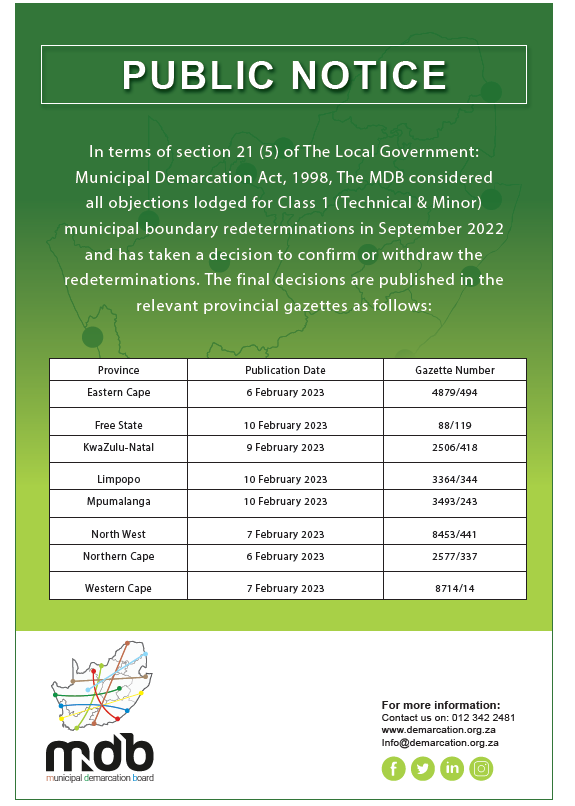
NECT promotes home language reading
NECT promotes home language reading tsoanaThe National Education Collaboration Trust (NECT) has developed 189 indigenous language storybooks to promote home language reading in foundation phase classrooms across the country.
At least 21 titles have been developed in nine of South Africa’s official languages, namely Siswati, Setswana, Sepedi, Tshivenda, Xitsonga, IsiXhosa, IsiNdebele, IsiZulu and Sesotho.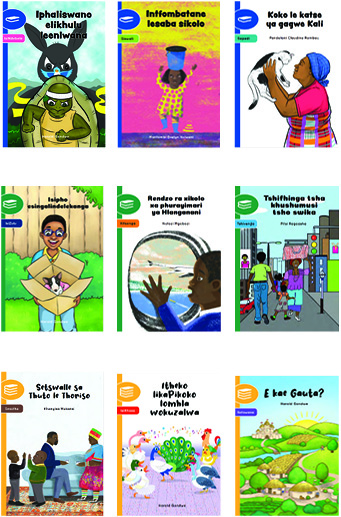
The idea for the creation of these storybooks stemmed from the need to support teaching and learning in home languages, particularly in the early grades.
According to the World Bank, children learn more and are more likely to stay in school for longer if they are taught in a language that they speak and understand.
Basic Education Minister Angie Motshekga has previously noted that given the demographics of South Africa, more than 80% of children are taught in a language that is not their own.
Through the development of these 189 home language titles, the NECT is supporting the Department of Basic Education’s efforts to elevate home languages by providing reading resources that will support the teaching of reading and also promote reading for enjoyment.
“The stories should help learners identify with their personal, social and cultural identities, and they will also assist in bridging the gap between home and school,” said National Reading Coalition (NRC) Project Manager Bailey Nkuna.
The NECT’s reading programme manager, Dr John Thurlow, said hard copies would be made and distributed to children in disadvantaged communities through the organisation’s focused reading programmes.
“We will also be disseminating them through a digital campaign with the aim of improving access to home language resources,” he added
The NRC's goal is to make age and content appropriate reading resources available to learners, teachers and parents.
The NECT indigenous language storybooks can be downloaded from https://nrc.org.za/books/>
President declares State of Disaster
President declares State of Disaster JoyPresident Cyril Ramaphosa has declared a National State of Disaster – with immediate effect – as a response to the current energy crisis facing South Africa.
 For a while now, Eskom has been battling to keep the lights on, leading to increased stages of load shedding and a devastating impact on lives, livelihoods and businesses.
For a while now, Eskom has been battling to keep the lights on, leading to increased stages of load shedding and a devastating impact on lives, livelihoods and businesses.
On Thursday the 9th of February 2023, the President announced the State of Disaster during the State of the Nation Address at Cape Town City Hall.
“In a time of crisis, we need a single point of command and a single line of march. Just as we address the cause of the crisis, we also need to address its impact. The crisis has progressively evolved to affect every part of society,” the President said.
He added that government must act to lessen the impact of the crisis on farmers, small businesses, water infrastructure, transport networks and several other areas and facilities that affect citizens’ lives.
“In considering all these matters and the crisis that we are in, the National Disaster Management Centre has consequently classified the energy crisis and its impact as a national disaster. We are therefore declaring a National State of Disaster to respond to the electricity crisis and its effects,” President Ramaphosa said.
He emphasised that the devastating energy shortage in which the country finds itself requires the government to move with increased urgency.
“Extraordinary circumstances call for extraordinary measures. The energy crisis is an existential threat to our economy and social fabric. We must spare no effort, and we must allow no delay, in implementing these measures,” he said.
How it will work
The President explained that the declaration will enable the government to provide practical measures to assist businesses that have been devastated by the effects of load shedding.
“The State of Disaster will enable us to provide practical measures that we need to take to support businesses in the food production, storage and retail supply chain, including for the rollout of generators, solar panels and uninterrupted power supply,” he said.
Where technically possible, the President said the State of Disaster will also enable the country to exempt critical infrastructure such as hospitals and water treatment plants from load shedding.
“It will enable us to accelerate energy projects and limit regulatory requirements while maintaining rigorous environmental protection as well as procurement principles and technical standards,” he said.
President Ramaphosa assured the public that expenditures related to the State of Disaster will be monitored closely by the Auditor General’s office to guard against abuse of any funds needed to address the energy crisis.
Furthermore, a Minister of Electricity in the Presidency is expected to be appointed to focus solely on bringing the country out of the current energy crisis.
“I will appoint a Minister of Electricity in the Presidency to assume full responsibility for overseeing all aspects of the electricity crisis response, including the work of the National Energy Crisis Committee,” the President said.
He added that the Minister will focus full-time and work with the Eskom board and management on ending load shedding and ensuring that the Energy Action Plan is implemented without delay.
The President also said the National Treasury is finalising a solution to Eskom’s R400 billion debt burden in a manner that is equitable and fair to all stakeholders, which will enable the power utility to make necessary investments in maintenance and transmission.
“Government will support Eskom to secure additional funding to purchase diesel for the rest of the financial year. This should reduce the severity of load shedding as Eskom will be able to use its diesel-run plants when the system is under strain,” he said.
Eskom has launched a programme to buy excess power from private generators and has already secured 300 MW from neighbouring countries.
Furthermore, the President added that the South African Police Service has established a dedicated team with senior leadership to deal with the persistent corruption and theft at several power stations that have contributed to the poor performance of the stations. -SAnews.gov.za
SA beefs up protection for whistleblowers
SA beefs up protection for whistleblowers JoyPresident Cyril Ramaphosa says government is working on mechanisms to improve protection for those who blow the whistle on corruption.
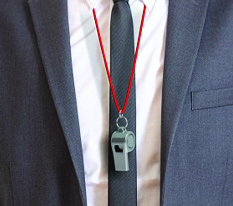 “We are working to capacitate the Witness Protection Unit and will introduce amendments to the Protected Disclosures Act and Witness Protection Act to strengthen protection for whistleblowers,” he said during the State of the Nation Address (SoNA).
“We are working to capacitate the Witness Protection Unit and will introduce amendments to the Protected Disclosures Act and Witness Protection Act to strengthen protection for whistleblowers,” he said during the State of the Nation Address (SoNA).
President Ramaphosa said work is already underway to improve access to the witness protection programme for public servants who expose maladministration, corruption and unethical conduct.
“We will finalise the draft Public Procurement Bill to address weaknesses identified by the State Capture Commission and improve efficiency, value for money and transparency. Our reinvigorated law enforcement agencies are taking firm action against companies and individuals alleged to have been involved in state capture,” President Ramaphosa said.
President Ramaphosa said the National Prosecuting Authority (NPA) Investigating Directorate, established in 2019, has taken 187 accused persons to court in 32 State capture and corruption cases.
“Over R7 billion has so far been returned to the State from State capture cases. To date, R12.9 billion of funds and assets have been frozen. This year, the Investigating Directorate will be established as a permanent entity within the NPA,” he said.
These efforts are in line with the President’s appointment of the National Anti-Corruption Advisory Council in August 2022. The Council consists of people from across society who advise on suitable mechanisms to stem corruption, including an overhaul of the institutional architecture for combatting corruption.
President Ramaphosa said for the country to achieve any progress in addressing the urgent challenges it faces, there can be no compromise in building a capable and effective state. – SAnews.gov.za
Did you know?
You can report corruption to the Special Investigating Unit by calling 080 003 7774 or contact the National Anti-Corruption Hotline on 0800 701 701
SONA in numbers
SONA in numbers tsoanaThe State of the Nation Address (SoNA) was recently delivered by President Cyril Ramaphosa who provided feedback on government programmes over the previous year.
The President also unveiled new plans for 2023 and beyond. Vuk’uzenzele unpacks the programmes in numbers.
Employment
• One and a half million – new jobs created in our economy between the third quarters of 2021 and 2022.
• More than one million – people provided with work and livelihood opportunities by the Presidential Employment Stimulus.
• 50 000 – pa rticipants recruited by the Social Employment Fund in its next phase to work for the common good.
rticipants recruited by the Social Employment Fund in its next phase to work for the common good.
• 36 000 – opportunities to be created through non-profit and community-based organisations by the revitalised National Youth Service.
• 10 000 – the first cohort of unemployed young people appointed by the Department of Home Affairs to digitise more than 340 million paper-based civic records.
• More than 340 million – paper-based civic records to be digitised by the first cohort of 10 000 unemployed young people appointed by the Department of Home Affairs.
• More than three million – users registered on SAYouth.mobi, a zero-rated online platform for young South Africans to access opportunities for learning and earning.
Energy
• 4 000 to 6 000 – megawatts of electricity shortfall to be addressed.
• 80% – electricity produced by coal-fired power stations.
• R400 billion – Eskom’s debt burden.
• 300 – megawatts of excess power from private generators already secured from neighbouring countries.
• 43 – arrests made through intelligence-driven operations at Eskom-related sites.
• More than 100 – projects of private developers allowed to generate electricity.
• 6 – months within which Eskom can deploy emergency power.
• Over the next 12 to 18 months – period for a massive increase in power to the grid.
• R1.5 trillion – money to be invested in the economy through the Just Energy Transition Investment Plan over the next five years in new frontiers such as renewable energy, green hydrogen and electric vehicles.
• Over R100 billion – value of investment in renewable energy projects attracted by the Northern Cape.
Agriculture and land
• Around 140 000 – small-scale farmers who received input vouchers to buy seeds, fertiliser and equipment, providing a boost for food security and agricultural reform.
• 640 000 – hectares of cultivated land of small-scale farmers.
• 68% – percentage of women among around 140 000 small-scale farmers who received input vouchers to buy seeds, fertiliser and equipment, providing a boost for food security and agricultural reform.
• 250 000 – more vouchers government aims to provide to small-scale farmers in 2023.
Investment and economy
• R367 billion – investment commitments raised at the 4th South Africa Investment Conference in 2022.
• More than  R2 trillion – value of a new 2028 target in new investment to be mobilised at the 5th South Africa Investment Conference in April 2023.
R2 trillion – value of a new 2028 target in new investment to be mobilised at the 5th South Africa Investment Conference in April 2023.
• Almost 1 000 – black industrialists participating in the Black Industrialist Programme.
• More than 400 000 – workers who own shares in the firms they work for.
• Over 90 000 – entrepreneurs set to benefit from the R1.4 billion that government, through the Small Enterprise Finance Agency, plans to provide.
• R10 billion – value of the fund government plans to establish, in partnership with the SA SME Fund, to support small, medium and micro enterprises’ growth.
Social security
• More than 25 million – people who receive some form of income support.
• Around two million – indigent households receiving free basic water, free basic electricity and free solid waste removal.
• Around 60% – budget government spends on the social wage, providing various forms of support, basic services and assistance to households and individuals to combat poverty and hunger.
• Around 7.8 million – people who continue to receive the Social Relief of Distress Grant to counter the rising cost of living.
Safety and security
• 12 000 – new police personnel government undertook to recruit in 2022.
• More than 10 000 – new recruits who graduated from police academies since 2022.
• 10 000 – further new recruits to be recruited and trained in 2023.
• 20 – identified hotspots in which Multidisciplinary Economic Infrastructure Task Teams are now operational.
Infrastructure
• 13 – commuter rail lines reopened by the Passenger Rail Agency of South Africa, significantly reducing the cost of travel for many workers.
• 90 – days of the reduced turnaround time for applications for water-use licences.
• R600 million – money allocated to Infrastructure South Africa for project preparation, specifically in rural and under-resourced areas.
• R232 billion – value of infrastructure projects under construction, by January 2023.
• Nearly R4 billion – value of completed infrastructure projects, by January 2023.
• R18 billion – value of South African National Roads Agency road construction contracts awarded over the last three months.
• 24 – bridges under construction in KwaZulu-Natal, by February 2023.
Crime and corruption
• 187 – accused persons taken to court by the National Prosecuting Authority’s Investigating Directorate in 32 state capture and corruption cases.
• 32 – state capture and corruption cases of 187 accused persons taken to court by the National Prosecuting Authority’s Investigating Directorate.
• Over R7 billion – money returned to the State from state capture cases.
• R12.9 billion – funds and assets frozen by February 2023.
• R27 billion – a potential saving that National Treasury estimates government could achieve in the medium term if it deals with overlapping mandates, closes ineffective programmes and consolidates entities, where appropriate.
South Africa to produce more skills
South Africa to produce more skills JoyPresident Cyril Ramaphosa says South Africa will expand its vocational education and training system to produce the skills that the country needs.
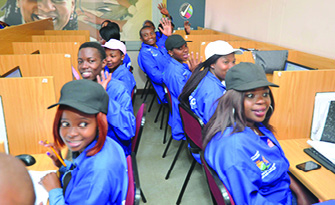 According to President Ramaphosa, who recently delivered the State of the Nation Address (SoNA), this will be done through the implementation of the approved curriculum of the three-stream model.
According to President Ramaphosa, who recently delivered the State of the Nation Address (SoNA), this will be done through the implementation of the approved curriculum of the three-stream model.
This year, he said the government plans to finalise the Comprehensive Student Funding Model for higher education.
This will be aimed at students who fall outside current National Student Financial Aid Scheme (NSFAS) criteria, reaching those who are known as the “missing middle”.
“Access to quality education for all is the most powerful instrument we have to end poverty,” the President said.
He said the country needs to start with very young children, providing them with the foundation they need to write and read for meaning, to learn and develop.
“It is, therefore, significant that the number of children who receive the Early Childhood Development (ECD) subsidy has more than doubled between 2019 and 2022, reaching one and a half million children,” he said.
In addition, he announced that the Department of Basic Education is streamlining the requirements for ECD centres to access support and enable thousands more to receive subsidies from the government.
The President applauded last year’s matric pass rate of 80%, with all provinces showing improved results.
The share of bachelor passes in no-fee schools improved from 55% in 2019 to 64% in 2022.
This, he said, means that the performance of learners from poorer schools is steadily improving, confirming the value of the support that government provides to them.
“What these results reveal is that there is a silent revolution taking place in our schools,” he said.
The President reiterated that schools should be safe and allow for effective learning and teaching.
In this regard, he said the Sanitation Appropriate for Education Initiative – known as SAFE – together with the government’s Accelerated School Infrastructure Delivery Initiative has built 55 000 appropriate toilets with resources from the public and private sectors.
Western Cape residents urged to apply for affordable housing
Western Cape residents urged to apply for affordable housing tsoanaThe Western Cape Department of Human Settlements has encouraged first-time homebuyers to take advantage of the over 500 affordable housing opportunities available across the province.
According to the provincial department, the available homes specifically cater for households with a gross income of between
R3 501 and R22 000 per month.
Housing opportunities range from one, two and three-bedroom homes at Forest Village in Cape Town; Syferfontein in George and Mill Park in Bredasdorp.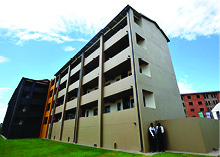
Western Cape residents are urged to apply for the department’s Help Me Buy a Home/Finance Linked Individual Subsidy Programme (FLISP) subsidy to purchase one of the available housing opportunities.
The Help Me Buy a Home/ FLISP subsidy is designed to assist first-time homebuyers to acquire a home.
“The subsidy will essentially assist to reduce monthly bond or loan payments, making it more affordable to purchase a home. Qualifying applicants will receive a subsidy based on their gross household income,” the department explained.
According to Western Cape Infrastructure MEC, Tertuis Simmers, there are numerous housing opportunities in prime residential areas across the province.
“If your household income is between R3 501 to
R22 000 per month, and you meet the qualifying criteria, this subsidy can assist you to purchase your first home. We encourage young professionals, first-time homeowners and those starting a family to research the options available to get their foot into the property market.”
To date, over 250 Western Cape residents have purchased their first homes in one of the department’s three developments, using the Help Me Buy a Home/ FLISP subsidy.
At present, there are 571 housing units still available in the Eerste River, Cape Town, George and Bredasdorp developments.
Residents are encouraged to check the qualification criteria and to submit an application for one of the available housing opportunities.
Details of the units and contact details of the agents can be found on the department’s website at www.westerncape.gov.za/dept/human-settlements/documents/public_i.
In addition, residents can contact their nearest municipal housing office or the Department of Human Settlements at 27 Wale Street, Cape Town or 021 483 6488 / 0611 / 8984 / 0623 / 2060 or email human.settlements@westerncape.gov.za.
Apply for a FLISP subsidy at your local Department of Human Settlements office, call the National Housing Finance Corporation on 010 085 2199 or contact the office in Cape Town on 021 552 1780
Work on Basic Income Support is underway
Work on Basic Income Support is underway JoyGovernment is working on a way to develop a mechanism for targeted Basic Income Support (BIS) for the most vulnerable, within the country’s economic constraints.
 “This will build on the innovation we have introduced through the Social Relief of Distress (SRD) Grant, including linking the data that we have across government to make sure we reach all those who are in need,” said President Cyril Ramaphosa during the State of the Nation Address (SoNA).
“This will build on the innovation we have introduced through the Social Relief of Distress (SRD) Grant, including linking the data that we have across government to make sure we reach all those who are in need,” said President Cyril Ramaphosa during the State of the Nation Address (SoNA).
In December 2021, the Department of Social Development (DSD) launched the Expert Panel Report on BIS.
A team of experts on BIS recommended that government gradually implement a Basic Income Grant, starting with the existing COVID-19 SRD Grant being institutionalised and forming a platform for an expanded system of BIS.
The expert panel was established as part of an International Labour Organisation initiative, together with the DSD, to examine the feasibility of Basic Income Grant options for South Africa.
R350 SRD Grant
In a bid to mitigate the rising cost of living, President Ramaphosa further announced that government will continue with the R350 SRD Grant.
The R350 SRD Grant currently reaches around 7.8 million people across the country.
Government introduced the SRD Grant in May 2020 as a temporary measure to respond to the needs of the most vulnerable, who were affected by COVID-19-induced lockdown measures.
The President noted that the rising cost of living is deepening poverty and inequality, with millions of South Africans unable to provide for themselves and their families.
“It is the job of the State to provide a minimum level of protection below which no South African will fall. Right now in our country, there are more than 25 million people who receive some form of income support,” said the President.
“We will ensure that existing social grants are increased to cushion the poor against rising inflation.”
In addition, the President highlighted that around two million indigent households receive free basic water, free basic electricity and free solid waste removal.
He noted that around 60 percent of government’s budget is spent on what is known as the social wage, providing various forms of support, basic services and assistance to households and individuals to combat poverty and hunger. – SAnews.gov.za
Working towards affordable electricity
Working towards affordable electricity JoyThe recent announcement of an increase in electricity tariffs comes at an extremely difficult time for citizens and businesses alike, who are already contending with the high costs of fuel, food and other essentials.
 It is in this context that I made a call recently for the Eskom board to consider measures that can help to mitigate the impact of the 18.65% increase from an implementation timeframe point of view.
It is in this context that I made a call recently for the Eskom board to consider measures that can help to mitigate the impact of the 18.65% increase from an implementation timeframe point of view.
The new tariff was approved by the National Energy Regulator of South Africa (NERSA) following a prescribed process, which includes wide-ranging public consultation. It is important that we affirm the independence of NERSA and the importance of following the due legal process in setting tariffs.
Tariffs that reflect the cost of producing electricity are necessary for Eskom’s financial sustainability and for the utility to be able to service its debt and to undertake the critical maintenance that is needed to end load shedding.
Yet, there is little doubt that increasing the price of electricity now, at this challenging time, will add to the difficulties South Africans are facing. Rising food and energy prices are fuelling a cost of living crisis around the world, and the poor are being hardest hit. In South Africa, food prices have increased on average by 12% over the past year.
This is the problem we face: we have to ensure that Eskom has the resources it needs to resolve the electricity crisis while protecting South Africans from the effects of higher prices.
There is no simple answer to this problem. That is why all stakeholders, including government, Eskom, business, labour and communities, need to work together to achieve a very difficult balance. At all times, we must be guided by the needs and interests of South Africans, especially the poor, both now and into the future. We should be wary of short-term solutions that we will regret in years to come.
As government we will continue to implement policies and measures to mitigate the hardship being experienced by vulnerable citizens. Since the earliest days of democracy we have implemented a policy of free water and electricity for indigent households. The free basic electricity allowance, if implemented properly by municipalities, should shield the poorest households from the effect of the tariff increase. We remain absolutely committed to this policy.
Other programmes to expand the social wage include the provision of free primary healthcare, exempting learners from poor families from paying school fees, a school nutrition programme that supports over nine million learners countrywide, and the provision of free tertiary education for students from poor families. The zero-rating of basic food products for VAT helps to decrease their cost for the poor.
The national minimum wage, which was introduced in 2019, has improved the remuneration of many workers, especially farmworkers, domestic workers and other vulnerable workers.
Another means by which the state is supporting society’s most vulnerable from excessive price increases is through competition policy. During the pandemic, the Competition Commission used its powers to bring down the prices of COVID-19 tests and suppliers found guilty of overcharging for face masks were fined.
The Competition Commission monitors essential food prices, and recently found that consumers were facing ‘opportunistic increases’ in the prices of sunflower oil, a basic cooking staple for millions of households.
All of these measures provide an important ‘social wage’ that has helped to cushion poor households from the worst effects of rising prices. Government is considering additional mechanisms to address the rising cost of electricity. These include measures such as helping households and small businesses install solar power and energy saving devices, supporting households with rechargeable lights, and working with learners to catch up where load shedding interrupts lessons. We should be able to provide further information on these and other initiatives in the coming weeks.
As we work together to overcome the energy crisis, I call on all South Africans to pay for the electricity they use. We can only improve and expand the provision of electricity and other basic services if government and municipalities in particular have the means to do so. Non-payment and illegal connections make electricity provision more expensive and less reliable.
The global cost of living crisis has been described as a once in a generation economic shock, and it is being worsened by global events that are beyond our control.
As government we will continue with our efforts to expand the social wage, just as we accelerate our efforts to restore a reliable and secure electricity supply. We will continue to pursue closer cooperation with all social partners and public entities to find sustainable ways to shield South African households from the worst effects of rising energy and other costs.